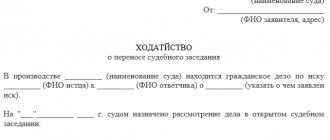What is a litigation
A judicial dispute is a procedural interaction between participants in a trial (court, court, defendant, etc.), and is a generalized concept of the rights to action when going to court, to judicial protection and equal participation in judicial proceedings.
About the types of disputes in court and the features of filing a claim
The types of legal disputes and the process of their consideration can be divided into other groups, depending on the reason for filing the claim and the composition of the participants in the proceedings:
- In cases arising on the basis of administrative-legal relations, the process is initiated by filing a complaint.
- Claim proceedings - the process is initiated by filing a claim in court.
- Special legal proceedings - the process is initiated by filing an application.
If the rights and freedoms of a citizen are infringed, he becomes a participant in the lawsuit by filing a statement of claim in court. Legal proceedings can be initiated for a variety of reasons and reasons; the initiator of the process can be either an ordinary citizen or the state, represented by the tax service and other government agencies.
Types of litigation
You can independently familiarize yourself with the types of law and understand each of the types of disputes that interest you using the links below.
- Civil disputes
- Banking disputes
- Housing disputes Housing and communal disputes
- according to OSAGO
- Disputes over loan agreements
Stages of a legal dispute
- Filing a claim in a city or arbitration court.
- Acceptance of the claim by the court.
- Preliminary court hearing (preparation).
- Evidence, documents and examinations (the independence and objectivity of the examination plays a big role in legal disputes).
- Witnesses, experts and translators.
- Completion of trial and court decision.
- An appeal can be either appellate or cassation, and depends on which court made the decision at first instance.
Stages of legal proceedings
In civil proceedings, there are many stages in the progress of a case:
- The initiation of a legal case begins from the moment the judges make a decision to accept the statement of claim for consideration;
- Preparation for trial is a mandatory stage, which is carried out with the participation of the parties; at this stage, claims are clarified, procedural motions are considered, and measures are taken to secure the claim;
- Consideration of the case in the first instance is the most important and lengthy part, during which the parties provide their evidence, reveal their position, and refute each other’s evidence;
- Appeal proceedings If you do not agree with the court’s decision, file a complaint within the period established by law, since its submission will delay the entry into force of the decision, and therefore its execution;
- Proceedings on a cassation appeal in the vast majority of cases are practically the last chance to cancel or change it, since a very small number of cases are considered by way of supervision;
- Review by way of supervision, the supervisory authority represented by the Presidium of the RF Armed Forces, in essence, performs the function of monitoring the activities of lower courts;
- Revision of judicial acts based on newly discovered or new circumstances: newly discovered circumstances existed at the time of consideration of the case, but were not known to the party and could not be known, and new circumstances arose after the decision was made (cancellation of judicial acts that served as the basis for the decision, recognition transaction is invalid, etc.);
- Proceedings related to the execution of court decisions at this stage, for example, the defendant may ask the court to defer or installment execution of the decision if he has a difficult life situation, temporary absence of work or other unfavorable circumstances, and the plaintiff may petition to change the method of execution of the judicial act ( for example, change the collection of child support as a percentage of earnings to alimony in a fixed amount if the defendant does not have a regular income). Of course, not every case goes through all stages. This largely depends on the will of the parties, since all stages of the legal process arise only upon the application of the parties to the dispute.
Specifics of the legal dispute
As a rule, a legal dispute reflects a conflict between the parties regarding their different assessment of the circumstances of certain legal relations and (or) the rules of law applicable to them. The result of resolving a legal dispute is reflected in a judicial act.
The specificity is that the position on the case and the tactics of the dispute for the plaintiff or defendant must be determined in advance. Even before filing a claim in court, it is necessary to understand what goal the plaintiff is pursuing and whether this goal can be achieved by appropriate requirements.
Legal practice is a humanitarian science that borders on art. The gift of persuasion and the art of rhetoric have more than once helped clients out even in the most “stalemate” situations, and the matter ended in their favor. This is chess, where the strongest wins, and not just the one who is formally right. We are the strongest!
The first stage of working with a client is an oral or written legal consultation, during which the contours of the problem are outlined.
Next, information is collected on the case, work with conflicting parties and attempts to smooth out relations. Most often this is successful, but sometimes we have to take the case to court or arbitration, where we actively represent the interests of our client.
What you need to know to go to court
Anyone can apply to the court to protect their rights; for this it is not necessary to have a special education. Of course, it is better to seek the help of a specialist who is familiar with the judicial procedure for resolving disputes. But if there is no money for this or none of the possible options is credible, then anyone can go to court with a petition to resolve the controversial issue, armed with the Civil Procedure Code of the Russian Federation. Unified document forms and recommendations for filling them out, as well as step-by-step coverage of the procedure for considering legal disputes, can be found on the Internet.
Advice! To save on legal costs, you can agree with a professional lawyer to help you prepare documents and develop an argumentation strategy, and argue in court yourself.
Principles of trial
They must be studied before filing an application with the court. Fundamental theses, without which it is impossible to talk about fair and impartial administration of justice. The legal procedure must be based on the equality of the parties and their equality before the law.
Jurisdiction of civil cases by courts of general jurisdiction
The Russian judicial system has a complex multi-level structure and a regulated procedure for legal proceedings. Before going to court to protect your rights and legitimate interests, you should find out which structural unit and in what territory the application should be submitted.
Courts of general jurisdiction consider disputes arising from labor, family and public law relations. Resolution of commercial disputes is the competence of arbitration courts.
There are two types of jurisdiction: generic and territorial. The division of generic jurisdiction is determined by Articles 23-27 of the Code of Civil Procedure of the Russian Federation. Territorial jurisdiction involves many nuances and is regulated by Articles 28-32 of the Code of Civil Procedure of the Russian Federation. Disputes often arise between citizens living in different territories, and the procedure for their consideration is established for reasons of expediency.
Initiation of litigation
The basis for starting consideration of a civil case is a written reasoned appeal.
The form and name of this document, the procedure for its preparation, depend on the proceedings in which the appeal will be considered:
- a statement of claim is filed if the conflict situation is based on a dispute about the law between two or more persons; when preparing this document, one must be guided by subsection 2 of section 2 of the Code of Civil Procedure of the Russian Federation;
- a special proceeding is also initiated by the application, which is not based on a dispute about the right, there is no plaintiff and defendant, there is an applicant and interested parties (subsection 4 of section 2 of the Code of Civil Procedure of the Russian Federation);
- writ proceedings are initiated on the basis of an application for the issuance of a court order - (subsection I of section 2 of the Code of Civil Procedure of the Russian Federation).
In any case, the appeal is submitted in writing, signed by the applicant, indicating the respondent and interested parties. The information that must be contained in the application is listed in paragraph 2 of Article 131 of the Code of Civil Procedure of the Russian Federation.
The structure of the text should include:
- content – a clear, structured description of the events that led, in the applicant’s opinion, to a violation of his rights or the threat of such a violation;
- subject – the result that the applicant expects to achieve by going to court;
- grounds - motivated confirmation of the legality of one’s claims, supported by reference to documents and testimony of witnesses.
An application to the court necessarily requires documentary evidence. Copies of documents confirming the legality of the applicant’s demands must be attached to the application and a list of them must be indicated in the text. You should also attach copies of the text of the statement according to the number of parties to the dispute. The document is submitted to the court office against signature or sent by registered mail with notification.
Having accepted the application for consideration, the judge examines it, gets acquainted with the attached materials and makes a decision to initiate civil proceedings or to leave the application without progress.
Refusal to initiate proceedings can only be motivated and is most often associated with improper execution of the document or insufficient persuasiveness of the information contained in it. The application may be left by the court without progress until the circumstances preventing the consideration of the dispute are eliminated, of which the applicant must be notified.
Advice! Once faced with the return of an application, do not despair. The court's decision to refuse to initiate proceedings should be carefully studied, the required adjustments made to your document and the application resubmitted.
Rights and obligations of participants in legal proceedings
A person whose application is accepted for consideration by the court becomes a participant in the judicial consideration of the dispute, thereby acquiring all the rights and obligations associated with this status.
The basic civil procedural rights of participants in the judicial resolution of a dispute are contained in paragraph 1 of Article 35 of the Code of Civil Procedure of the Russian Federation.
Rights and responsibilities are directly related to the principles of judicial proceedings:
- the right, within the framework of legal proceedings, to receive, transmit and publish any information related to the case;
- the right to ask questions to participants in the process, attract witnesses and provide additional evidence in order to resolve the dispute;
- apply for examinations;
- the right to get acquainted with the case materials, make copies and make extracts;
- the plaintiff’s right to change the claim, abandon the claim, the defendant’s right to admit the claim, the parties’ right to enter into a settlement agreement;
The responsibilities of each participant are not strictly described in the law; they arise from the rights of other parties and the need to maintain order in the administration of justice.
Advice! If you are involved in legal proceedings as a defendant and you do not agree with the claim partially or completely, do not wait for the date of the scheduled hearing, prepare a reasoned objection to the claim and present it at the stage of the preliminary hearing of the case. This way you will save your time.
The procedure for legal proceedings and consideration of legal disputes provides for the parties to be aware of proper behavior. To avoid getting into an awkward position, you should come to the meeting educated on these issues.
You can familiarize yourself with judicial etiquette and the procedure for participating in the process by watching this video:
Proceedings in civil court
In civil proceedings, the main characteristics are adversarialism and equality of the parties. This means that if you want to win in court, you must take an active position:
- prove all the circumstances you stated,
- submit petitions and statements to the judge,
- challenge
- provide reasonable feedback and objections to each statement of the plaintiff (defendant),
- ask the judge to order an examination,
- involve a specialist or witness,
- attend meetings,
- appeal court decisions.
The progress of the case and the stages of the trial largely depend on the behavior of the parties. The court must be impartial and lead the process. The parties are responsible for collecting and providing all evidence and justifying their position. In order for the court to request evidence, the party requesting it must confirm that it cannot obtain it on its own.
Stages of the trial
The procedure for considering disputes does not end with the adoption of a decision in the first instance. If one of the participants in the process does not agree with the decision, he has the opportunity to appeal the court's decision. The procedure for applying to subsequent courts to resolve a dispute is also set out in detail in the Civil Procedure Code.
Advice! Before submitting an application to the court, it makes sense to refer to judicial practice. Information about dispute resolution procedures similar to the subject of your application may be helpful in gathering evidence and making arguments.
Conflict situations arise every day. To resolve them, you should know the legal procedure and use it to resolve disputes.
Knowledge of one’s rights and obligations, the ability to resort to legal instruments is the most important quality of a civilized person.
TOP most common litigation disputes in Russian business
- Debt collection One of the most common categories of litigation is the collection of receivables under executed contracts: contract, subcontract, supply, lease, investment, insurance, provision of services, leasing, etc. The specificity of these disputes lies in the fact that when collecting a debt, it is necessary to prove not only the existence of a concluded contract, but also its execution, which is most often expressed by a signed certificate of completion of work.
- Corporate disputes This type of legal proceedings arises in terms of controversial issues between the founders - owners of companies, the distribution of business between them, determining the legality of decisions made, the appointment or removal of management of organizations - general directors, presidents of companies, and other management officials. In this part, relations regarding the reorganization or liquidation of companies, amendments to the charter documents and, accordingly, the definition of new powers or the termination of part of the previous powers are also controversial. This category of cases also includes disputes regarding the determination and approval of large transactions, legal capacity to participate in such transactions, and many other legal disputes.
- Challenging the results of tenders, trades and auctions According to the legal community, disputes in this area have developed on a large scale and rapidly in the last five years, after legislation was introduced obliging commercial structures to engage in the execution of government orders in absolutely any industry, from purchasing equipment, attracting security companies or leasing premises, and ending with the supply of oil and gas. These disputes occur both in relations to invalidate trades, auctions or tenders, and to challenge the results of actions taken, for example, the results of services provided within the framework of a particular government order.
- Land disputes Land disputes are one of the most common types of disputes in the practice of arbitration courts. These include challenging non-normative acts of local authorities on the allocation of plots, withdrawal of plots from possession or property, recognition of the right to land plots, disputes under lease agreements, purchase and sale agreements, and other agreements, the result of which is the transfer of land from the state or municipal fund into the ownership or use of commercial structures.
- Tax and customs disputes This category of cases is the most difficult in economic legal relations, as it requires special knowledge in the field of tax and customs law, as well as excellent orientation in accounting and full acceptance of the language of numbers. Customs and tax disputes originate in challenging acts of tax and customs authorities, including claims for compensation from the state treasury for losses caused, refund of overpaid taxes, and end with relations regarding the determination of the tax base and the amount of tax deductions, challenging administrative tax penalties .
- Disputes in the field of contract law Disputes in the field of contract law may concern issues of termination of transactions due to non-fulfillment, recognition of transactions as invalid, a sham or imaginary transaction, etc. In addition, this type of dispute includes various cases related to compulsion to register contracts, or, conversely, recognition of the registration of contracts as unlawful. It is worth noting that the contracts that are the subject of consideration in arbitration courts are of a very different nature: purchase and sale agreements, lease agreements, supply agreements, construction contracts, investment agreements, etc.
- Real estate disputes “These disputes have their own specific nuances. For example, when it comes to investment relations in the real estate market, the courts for the most part do not recognize the rights to real estate for participants in investment activities until the signing of the act of implementation of the investment project and the main protocol for the distribution of space - In addition, the courts do not recognize the rights to real estate in buildings , not put into operation. As for the recognition of rights to non-residential and residential premises, arbitration courts conduct an inspection and careful study of all title documents indicating the emergence of the right to construction as such. At the same time, if the person applying to the court does not prove that in pre-trial order he took all the necessary measures to register the right of ownership, but was refused by all kinds of authorities, including Rosreestr, then the court will not satisfy the claim.”
- Disputes about insolvency (bankruptcy) These types of cases are distinguished by their long-term nature, i.e. processes last for years. Bankruptcy includes 4 stages, of which two are mandatory and two are optional: supervision (mandatory), financial recovery (optional), external management (optional), bankruptcy proceedings (mandatory). Mandatory stages, as a general rule, last 6 months, external management - no more than 18 months, while it is possible (and in practice this is exactly what happens) to extend the initial period of a separate stage for a new period. The monitoring process can last 12 or 18 months, the same happens with the bankruptcy process, which will not end until the bankruptcy trustee has judged all the debts that are assets for the bankrupt company.
Stages of trial
The legal procedure is strictly regulated and divided into stages. This is done so that the parties to the dispute can properly prepare, and the judge can form an objective opinion about the circumstances of the case and make a fair and impartial decision.
Before scheduling a trial, the judge must hold a preliminary hearing to familiarize himself with the positions of the parties.
The preliminary stage of judicial consideration of the dispute gives the parties the opportunity to:
- clarify your requirements;
- file a counterclaim;
- make petitions;
- identify circumstances that need to be further proven in order to objectively resolve the dispute;
- decide on a strategy for further action.
Sometimes this requires more than one meeting. The law does not regulate the time order of preliminary hearings; their duration must be set within reasonable limits so as not to delay the consideration of the dispute.
Preparatory part
This stage begins with the opening of the court session and precedes any formal meeting in the courtroom. During the preparatory part, the composition of the court and representatives of the parties to the dispute are announced. The judge explains to those present their rights and requests documents confirming the right to participate in the consideration of the dispute (power of attorney, lawyer's order).
Participants in the process file challenges, if any (the procedure is regulated by Articles 16-21 of the Code of Civil Procedure of the Russian Federation).
At any stage, the parties can meet each other halfway and conclude a settlement agreement, which will stipulate the terms of mutual concessions. The court has the right not to accept a settlement agreement if this is contrary to the law.
Consideration of the case on the merits
This is the main stage in the judicial review of civil disputes. It begins with a speech by the presiding officer, who reads out the materials of the case.
After which the court hears the explanations of the parties, interrogates witnesses and establishes a procedure for clarifying the circumstances referred to by the parties. All evidence presented by the parties is also examined.
Debate of the parties
A crucial moment when the plaintiff, defendant and other interested participants in a legal dispute have the opportunity to prove their case in the discussion. They summarize the information collected and made public in the previous stage.
The procedure for speaking in the debate is described in Article 193 of the Code of Civil Procedure of the Russian Federation. The parties consistently make argumentative speeches in support of their positions, after which, with the permission of the court, they exchange remarks.
You can learn how to be convincing when speaking in court and the procedure for presenting evidence when considering a dispute by watching this video:
Adoption and announcement of a court decision
After listening to the arguments of the parties and considering all the evidence presented, the court retires to the deliberation room to make a decision on the merits of the dispute. The time allotted for making a decision is also not regulated by law. Immediately after signing, the decision is announced in the courtroom. The appeal procedure is explained to the parties. After which the court session is declared closed.
To participants in the consideration of a dispute in court who were not present at the adoption of the court decision, copies of the decision are sent no later than five days after the announcement of the decision.
It enters into legal force after the period allotted for appeal has passed.
Litigation in various courts of Russia
The scope of our interests extends to civil, administrative and arbitration proceedings, including customs, tax and other complex category disputes. Our team consists of professional lawyers who have the qualities of fierce fighters, cold analysts and sensible people all rolled into one.
Our law firm was created to resolve disputes, including litigation.
It is also necessary to remember about the highest law - the Constitution, then - Constitutional laws, then Codes, Federal laws, Presidential Decrees, Government Resolutions and so on. The variety of cases that we have successfully conducted and are conducting will not allow us to succumb to any legal difficulties.
A good lawyer always monitors news regarding newly adopted laws and laws that, on the contrary, have become invalid and repealed. Resolutions of the Plenums of the Supreme Arbitration Court and the Supreme Court, Resolutions of the Constitutional Court of the Russian Federation, and many other documents are sometimes in the view of a lawyer more often than a judge.
Resolving legal disputes is our specialty, and in most cases we achieve positive results peacefully, without bringing the case to court. For this purpose, psychological methods of persuasion, the ability to work with people, and sense the situation are used.
List of litigation services
- Representation of clients' interests in arbitration courts, courts of general jurisdiction and arbitration courts in all categories of disputes.
- Representation of the interests of clients in the Constitutional Court of the Russian Federation.
- Protection of honor and dignity of citizens and business reputation of legal entities.
- Arbitration and civil process.
Our employees - judicial representatives very often win disputes in arbitration court, and there is no reason to doubt that we will lower our professional “bar”. Accumulating extensive experience, we are constantly studying new trends in the legal system, training employees, closely monitoring competitors, introducing all the best methods and techniques.










